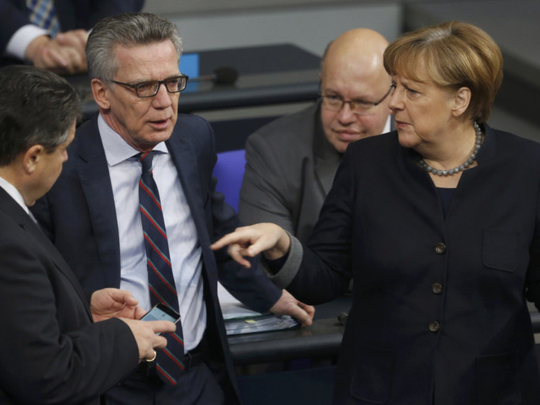
Rewind 50 years: It’s 1967, and for the second time that decade, the French president, Charles de Gaulle, had said “non” to British membership of what was then the European Economic Community (EEC). Politically and economically, Britain was incompatible with the structure and ambitions of the common market, he said, and he warned that if British membership was imposed, it would lead to the break-up of the EEC. His fears look today to have been more than prescient. Indeed, he was right on all counts. It might have saved everyone an awful lot of trouble had his view prevailed.
What’s more, his suggested alternative of a purely commercial relationship with Britain — “be it called association or by any other name” — looks very much like what the government of British Prime Minister Theresa May is asking of Brussels today. For Britain, membership of the EU was never anything more than a pragmatic, or economic endeavour. It was about little else than free trade and getting along with the neighbours. Few Brits ever shared the federalist vision of the project’s founding fathers. That’s always been a problem for the European Union (EU).
For many Europeans, Britain has long seemed a difficult and reluctant partner, constantly frustrating the ever closer and deeper union of “manifest destiny”. The loss felt by Europe’s established elites over Brexit is therefore mixed with a certain sense of relief, that finally after all these years a troublesome and disruptive cousin is about to leave the room. The lesson they are inclined to draw from Brexit is not that there is anything fundamentally wrong with the EU, but that Britain had never properly bought into it in the first place. The fault is seen to lie with the UK, not the EU. This is a huge mistake, if also an entirely predictable one that reflects the still delusional levels of self-belief prevalent in much EU thinking. Like the House of Bourbon, the EU establishment seems blind to the discontents massing at its doors. There has been no obvious attempt even to understand what led to Brexit, still less to act on the lessons. The same concerns — immigration, economic failure, distant government and increasingly alien law-making - are common to the whole of Europe, and yet the EU ploughs on regardless. Making Britain suffer for leaving is seen as more important than answering underlying concerns. It’s an almost wilfully self-destructive approach. Even in Germany, which arguably benefits more than any other nation from the European Union, the pressure for change is at boiling point, with the Eurosceptic Alternative fur Deutschland achieving 16 per cent support in recent polls. If sustained in an election, it would destroy the post-war German political contract, which has thus far made the emergence of any significant Right-wing threat to the centrist Christian Democrats and Christian Social Union party all but impossible.
The dangers are even more evident in France, where exactly the same forces that gave rise to Brexit and Trump are present in magnified form — de-industrialisation, increasingly insecure employment prospects, loss of national identity, and growing alarm over immigration. In Britain, the Tories have cleverly managed to harness these discontents to their own purposes. May calls it “change and conserve”, a long-standing Tory approach to upheaval which helps explain why the Conservatives have proved such a durable force in United Kingdom’s politics. Hey presto, a vote which was at least in part a scream of rage against globalisation, put through the prime minister’s mangle, becomes reinterpreted as a vote for a “global Britain”.
This type of bend-with-the-wind leadership is proving much more problematic for the established centre ground of continental politics, wedded as it is to fulfilment of the European project. Angela Merkel, the German Chancellor, has been quite visibly traumatised by the election of Donald Trump as the President of the United States, a political leader who seems to desire the destruction of the EU almost as much as Russian President Vladimir Putin. Friendless and increasingly isolated, she is like a rabbit frozen in the headlights, incapable of answering the now evident insurgency sweeping the continent around her.
Religious adherence to the EU’s “four freedoms” rules out any move backwards towards a Europe of more sovereign nations; by the same token, fear of the electoral consequences make it impossible to move forwards to the politically integrated Europe necessary to salvage the continent’s ill-advised experiment in monetary union. Into this void step the vehemently anti-EU Geert Wilders of the Netherlands and France’s Marine Le Pen. We are told there is little chance of either of them gaining power, but exactly the same thing was said of Brexit and the election of Trump. In both countries, there is a sneaking admiration for Britain’s willingness to grasp the nettle, as well as a growing belief that too high a price is being paid for European solidarity. Something big is happening. For better or worse, the established political and international order, born out of the ravages of the Second World War, is drawing to a close. Only the EU’s high command seems stubbornly unwilling to listen, and change course accordingly.
— The Telegraph Group Limited, London, 2017
Jeremy Warner, assistant editor of the Daily Telegraph, is one of Britain’s leading business and economics commentators.











